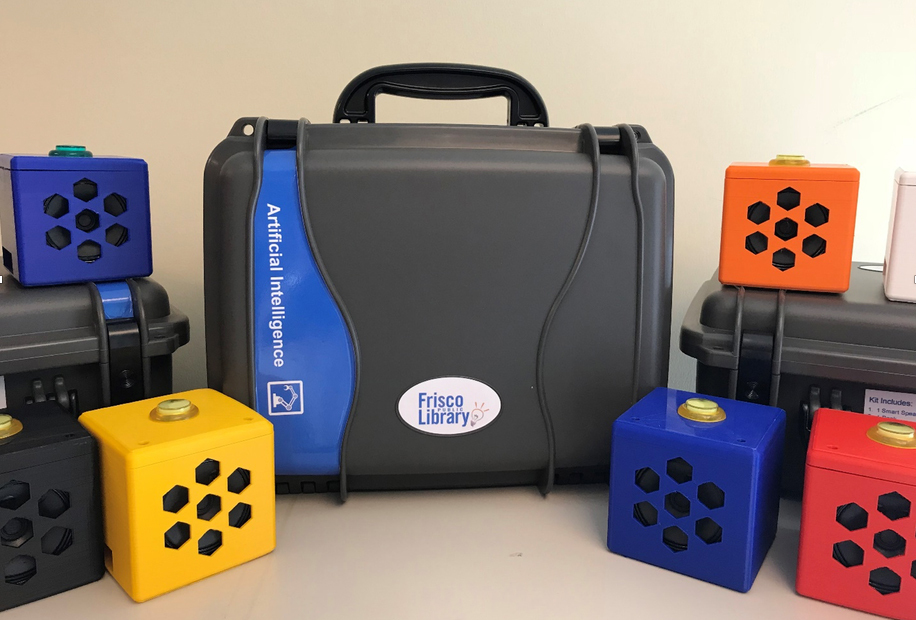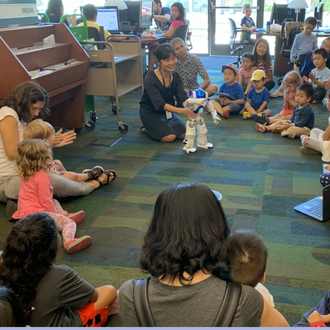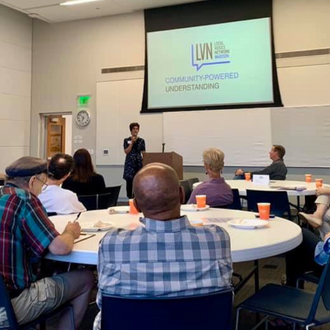Breaking Open Artificial Intelligence for the Masses
by Thomas Finley, Adult Services Manager, Frisco Public Library

When was the last time you were impressed with your Alexa or Google Home speaker? Impressed by the fact that it could listen and understand what you were saying to respond appropriately. All effective vocal recognition programs have artificial intelligence running under the hood, but we seldom take note that these applications were made possible by this technology. In fact, there is an interesting dynamic with AI currently submerging below the collective consciousness: when AI proves to be highly effective at performing a process or a task, it ceases to be “AI” and it simply becomes part of our daily lives. This is supposing that the majority of people even recognize that AI is ever involved in a task.
We are increasingly finding aspects of our daily existence colonized by AI; much of it is both mundane and useful (see: Alexa, mapping apps or email spam filters), but some of it hints at the dystopian risks for our society when this power falls in the wrong hands (see Arthur Holland Michel’s Eyes in the Sky for a chilling look at the automation of wide-area motion imagery). If these far-reaching, negative possibilities for the future of AI are not surprising to you, then what I have to say next might be: there’s still time.
[T]here is still time to participate in the AI revolution, and it is imperative for libraries to gain a firm grasp on AI tools and concepts.
The door is open for AI. Right now, there is an explosion of AI applications permeating the world around us but there is also an exponential increase in AI resources that are free or available at low-cost — thus enabling the average library user to get access to this technology. Google’s AIY Projects gives everyone access to some of their AI resources for free. IBM offers parts of its AI-powered chatbot, Watson Assistant, for free. Amazon has an array of AI resources that users can try for free, but what is amazing is that Amazon Web Services has opened up its own training courses for machine learning (an AI off-shoot) for everyone to access. Apple has also stepped into the fray with more developer-focused resources. There are many, many more open source tools for AI that are entirely or mostly free. The options become bewildering very quickly and it can seem like you still need a Ph.D. in computer science to tackle this for the library masses.
However, there is still time to participate in the AI revolution, and it is imperative for libraries to gain a firm grasp on AI tools and concepts. This is especially important due to the nature of changes in 21st-century work. Think of the last time you were in the checkout line of your grocery store: how many cashiers were there versus the number of self-checkout stations? We are already beginning to see the impact of large-scale automation upon the workforce. This change is occurring both qualitatively (i.e., which jobs will be well-paid) and, eventually, quantitatively (i.e., how many jobs are left after some human work is made obsolete by technology). Although this example references advances in automation, rather than the impact of AI at work, the mechanisms under the hood of these self-checkout stations rely on AI technology. Running inside the networks, inside the computers of the financial institutions that monitor these transactions, are an increasingly powerful sets of fraud detection systems that run on AI. These are saving banks and financial institutions millions of dollars a year on financial fraud. They are also enabling more efficient customer payment processes at stores.
According to the McKinsey Global Institute, half of all work tasks could be automated (with a combination of technologies — significant among them, AI). This points to a critical need for training and upskilling the current workforce to be able to meet the demands of this dynamic work landscape of the future.
Going back to our thought experiment with self-checkout machines at the grocery store: two telling questions come to mind that perfectly illustrate the winners of this burgeoning AI-enhanced economy. Ask yourself: how many people need to be on-hand to assist with those self-checkout transactions? Now ask yourself: how wide do you think the pay difference is between the self-checkout assistants and the people behind the financial transactions that are setting up and running AI processes? Don’t get me wrong, automation or AI in-and-of-itself is not “evil.” In libraries across the United States, self-checkout stations have been a godsend for maximizing direct staff relational time with patrons and automating transactional tasks (while budgets haven’t kept pace with demand). But the differences will be stark in our economy when profits are driving the power possibilities of AI.
According to the McKinsey Global Institute, half of all work tasks could be automated (with a combination of technologies — significant among them, AI). This points to a critical need for training and upskilling the current workforce to be able to meet the demands of this dynamic work landscape of the future. In fact, a different McKinsey paper reports that big business is starting to adopt the same language that we in libraries have been using for a few years now, “A key to companies’ future success will be in providing continuous learning options and instilling a culture of lifelong learning throughout the organization.” This sounds very similar to language used the 2014 Aspen Institute Report, Rising to the Challenge: Re-Envisioning Public Libraries.
[W]e view the library as the starting place for entrepreneurs of all ages and equitable AI education is fast becoming part of our core programming supporting that vision.
We are now at an exciting point of convergence between AI resources, AI education and public libraries. AI should be thought of as the next emerging technology for us to digest and help our users navigate; this aligns perfectly with our mission to make sure that the workforce is ready and able to meet new demands placed on it. Literacy is our foundation; AI is just the next area of skill development needed in a healthy economy. At the Frisco Public Library, we have been focused on supporting our community’s Innovation Ecosystem. To that effect, we view the library as the starting place for entrepreneurs of all ages and equitable AI education is fast becoming part of our core programming supporting that vision.
We had dipped our toes into several of the open AI apps, but it wasn’t until we experimented with the Google AIY Voice project kit that we found AI in an approachable package to run in a classroom setting (or at home in the kit). Using the Google AIY Voice project kit as a base framework, we built our Basic AI classes, which led to packaging up the kits as take-home AI Maker Kits. The idea being that one could take the class then check out the kit to further extend learning at home. This approach was an especially good fit for us because our experience in facilitating Python coding classes meshed well with the prerequisite knowledge needed to run the AIY Voice kit.
Literacy is our foundation; AI is just the next area of skill development needed in a healthy economy.
We are now averaging about 16 participants in the Basic AI classes. We began a new event this summer called Dev Day, where we packaged up some of our software development classes and invited in coding professionals to paint some big picture “Idea” sessions. Based on the popularity of both the AI Kits and classes, we reoriented a hands-on “Upskilling” track as a path to AI. Over 180 people attended.
We are at an exciting time where, once again, libraries can lead the way forward. The current danger in AI lies not in some far-fetched idea that it will turn humanity into paper clips. The real danger is in our lack of interest or participation in this revolution: there are just not enough people who understand how to construct, operate and manage these AI systems. AI is becoming a sort of black hole where information goes in, but none escapes to the uninitiated.
We must fight against this and the good news is, with the available tools at hand, we can!
Thomas Finley is the adult services manager of the Frisco Public Library. He is a public library innovator focused on making sure that libraries are ready for the future of work. He got his start by working as a book scout for Larry McMurtry in Archer City, Texas.

Want to learn more about library
leadership in the AI age?
This October 16-18, the 2019 ULC Forum: Preparing to Lead on AI + Digital Citizenship will convene our member community in Salt Lake City to engage in expert-led discussions and activities to elevate our shared understanding of the economic and social implications of emerging technologies.
Hosted by Salt Lake City Library and Salt Lake County Library, this important event will bring together leaders from major urban library systems across the U.S. and Canada. Together, we will map out how libraries can take ownership of their role at the forefront of the AI revolution, fostering and empowering digital-savvy citizens with services and tools that will strengthen democracy.
Related Articles

Lessons from the "Robo Dojo Master": Robotics and AI in Libraries
Palo Alto City Library
Palo Alto City Library's Dan Lou provides an overview of the library's efforts to lead robotics and AI education in order to help the community understand cutting-edge technologies and better prepare for an uncertain future.
Learn More

Local Voices Network: Using AI to Elevate Community Voices and Inform Library Planning
Madison Public Library
Learn how Madison Public Library partnered with Cortico’s Local Voices Network to capture community conversations and make community-informed decisions.
